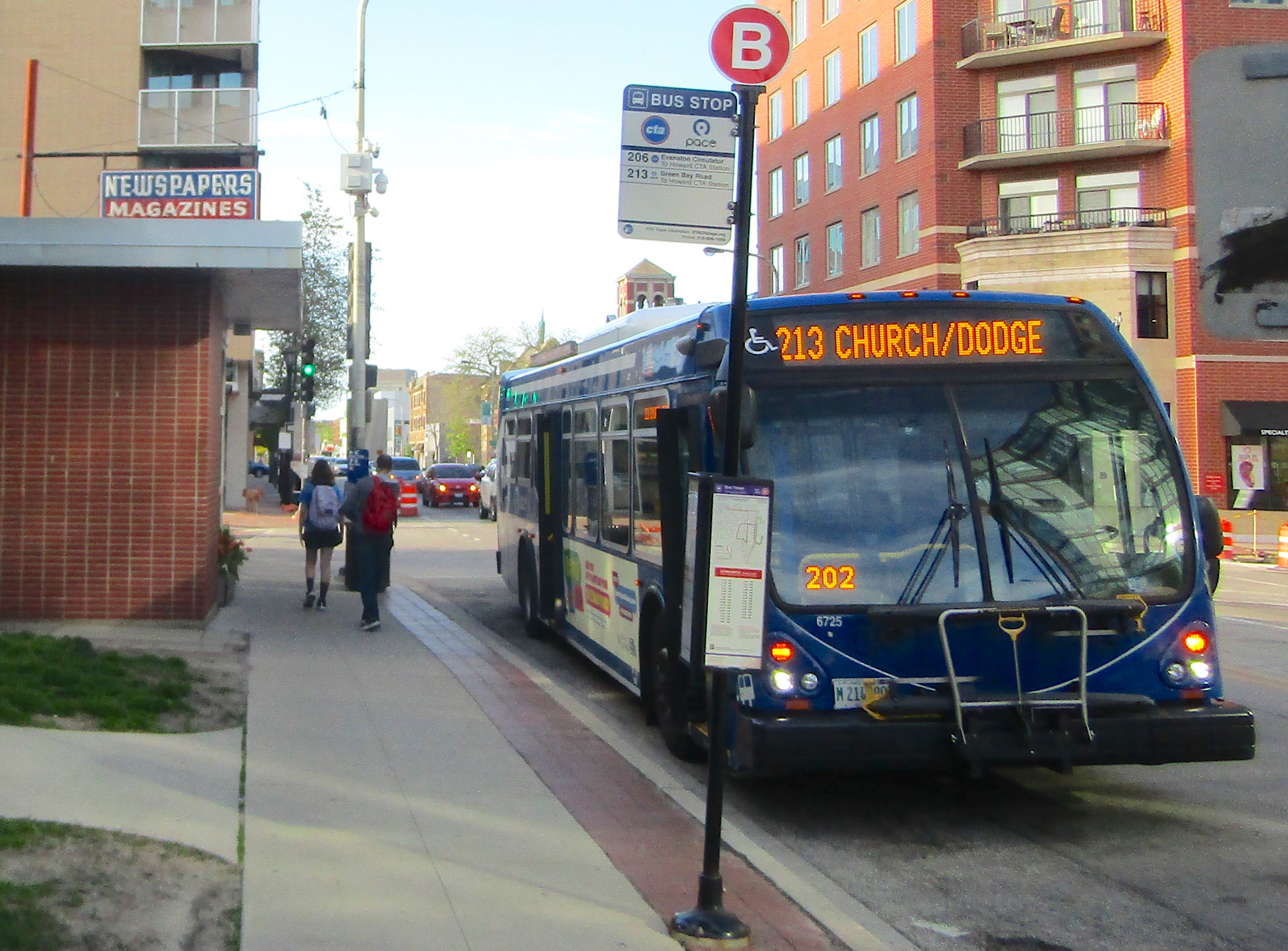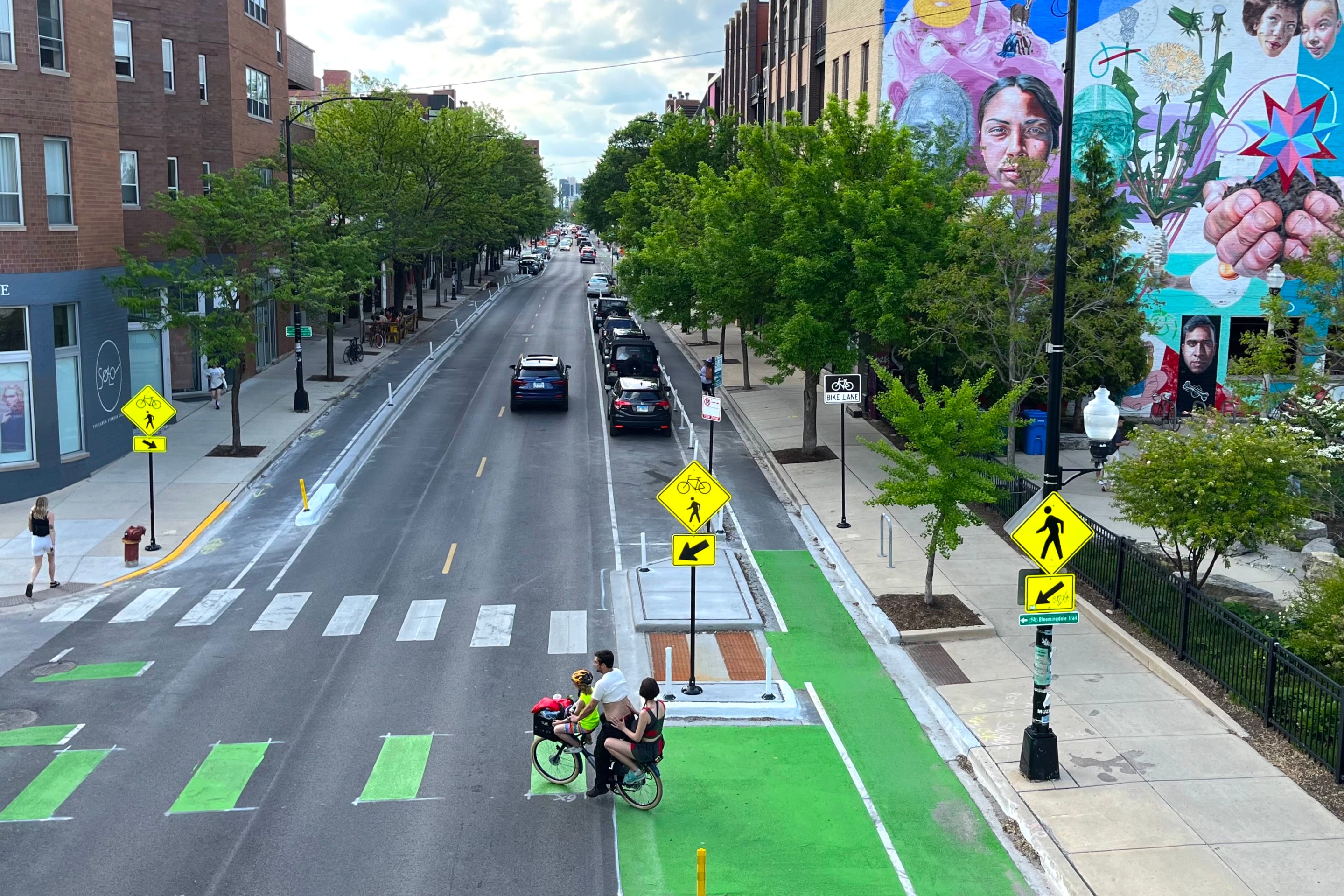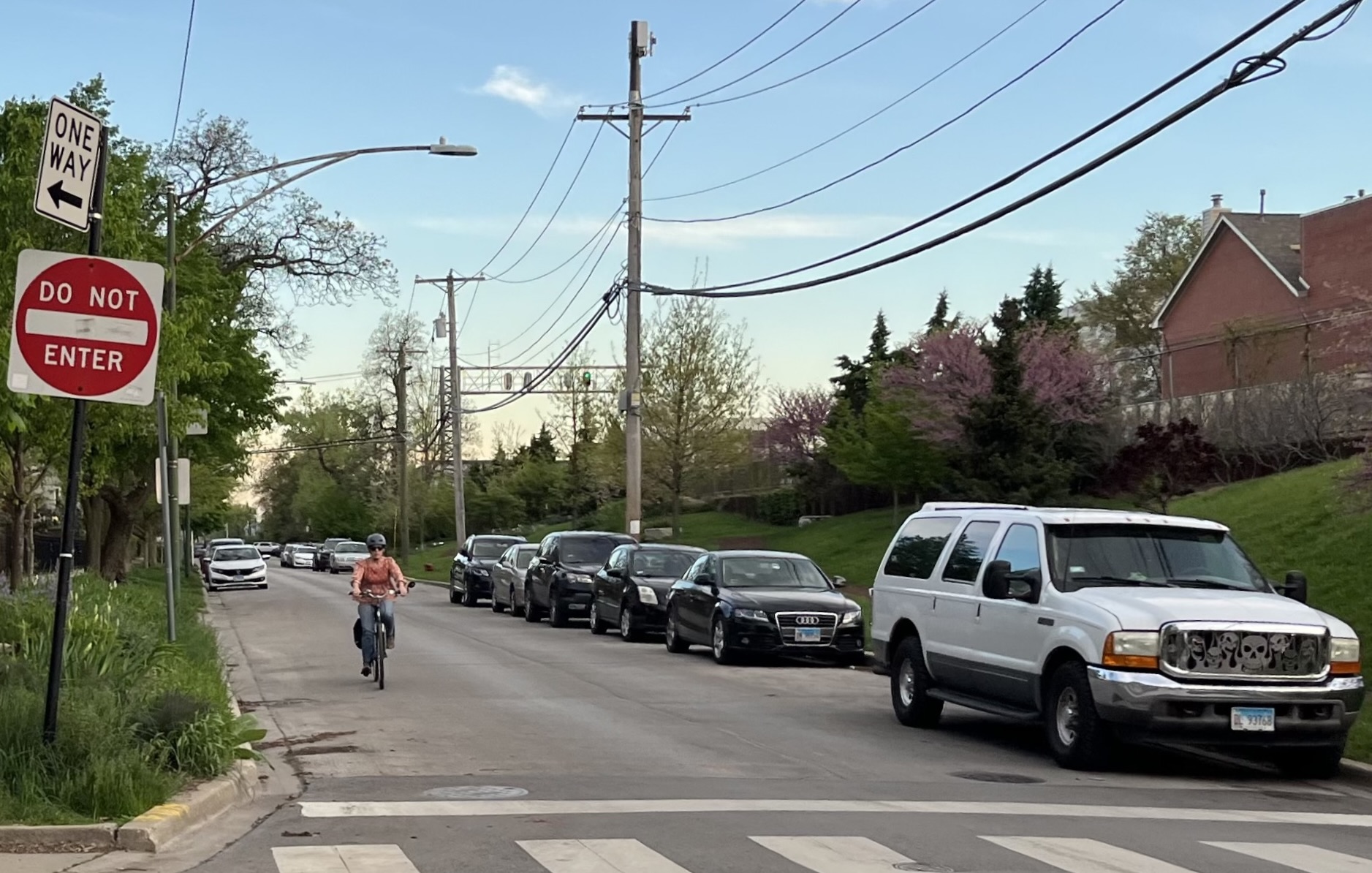WBEZ retracts claim that speed cams “don’t slow down” drivers, have “little safety benefit”
1:27 AM CDT on June 28, 2022

The WBEZ headline before and after Streetsblog and others called them out for it.
Update 7/1/22, 11:00 PM: WBEZ ran a new post admitting "We made a big correction to our story about the city’s speed camera ticketing program... Unfortunately, in the process of updating the story to reflect the controversy at City Hall, the story’s editors introduced a number of errors and did not take the final step of vetting the new material against the data analysis."
Update 6/28/22, 10:20 AM: Shortly after the WBEZ article was published on Monday morning, Streetsblog Chicago co-editor John Greenfield pointed out some of the problems with the WBEZ report in a Twitter thread. Around 6 p.m. that day, WBEZ ran a correction and radically overhauled its piece, completely retracting its previous claim that Chicago speed cameras "aren't slowing down" drivers and "show little safety benefit."
New @WBEZ report says Chicago's speed cams "show little safety benefit." Sure, a recent UIC study found our city's speed cams prevented 204 injury & fatality crashes in 2015-17. But, hey, it's not like transpo and urban planning profs are experts on this subject. 💁♂️@maerunes pic.twitter.com/zr6tAqrw0H
— John Greenfield (@greenfieldjohn) June 27, 2022
The full Streetsblog article deconstructing the WBEZ piece, below, wasn't published until several hours after WBEZ ran its correction. Still, we didn't see the correction until this morning, and it's interesting to note that WBEZ admitted to some of the exact mistakes Streetsblog called them out for in our post, such as fixating on the average speed of drivers who were ticketed at 11 mph+ with no mention of the fact that the number of tickets for 11 mph+ speeding decreased over time.
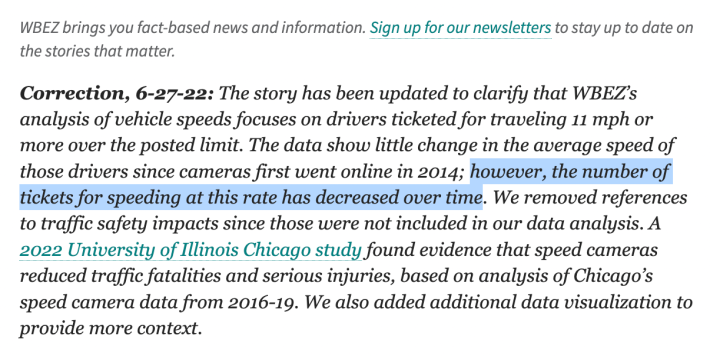
It's not surprising to see right-wing organizations like the Illinois Policy Institute publishing articles framing automated traffic enforcement as a massive injustice against drivers, with little or no acknowledgement of the proven safety benefits of speed and red light cameras, let alone discussion of the harm reckless motorists inflict on innocent people.
But it's disappointing when supposedly progressive news outlets approach this issue with a windshield point of view. That was the case with Monday's WBEZ Chicago report on speed cameras, which played up the financial hardship some lead-footed drivers have experienced, while completely disregarding traffic violence victims.
A piece by the left-leaning newsroom ProPublica published earlier this year had similar issues, but at least those reporters gave a brief acknowledgement that automated enforcement improves traffic safety. It noted, "In general, research has found that the cameras help reduce serious [crashes] by changing driver behavior." And it briefly cited some stats from Northwestern and University of Illinois at Chicago studies of our city's red light and speed cameras, respectively, which found that the cameras are doing their jobs by preventing injuries and deaths.
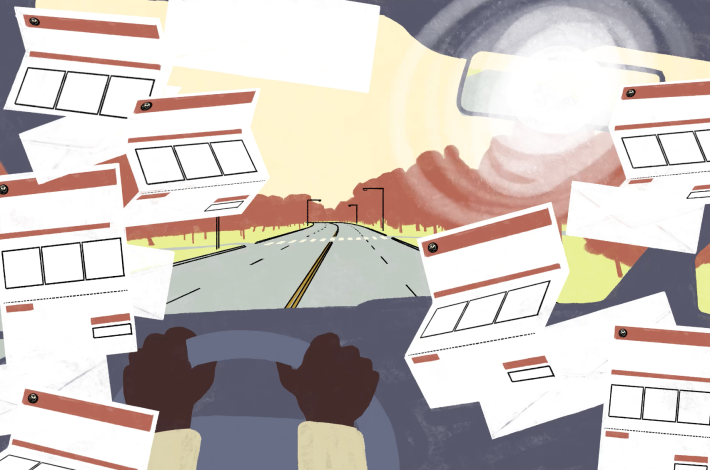
The UIC report, released in January, was written by Dr. Stacey Sutton and Dr. Nebiyou Tilahoun, professors in the university’s Department of Urban Planning and Policy. They concluded that during the period of 2015 to 2017, compared to expected traffic violence levels, the speed cameras reduced the number of severe and fatal injuries by 15 percent, and prevented 204 people from being injured (at any level of severity) or killed.
In contrast, WBEZ asserts in its title, "Chicago’s speed cameras yield more tickets and controversy – but drivers aren’t slowing down: A WBEZ analysis of Chicago’s speed ticket data shows little safety benefit, even as the city rakes in more cash."
WBEZ implies that the fact that Chicago lowered its speed camera ticketing threshold from 10 mph to 6 mph in March 2021, and traffic deaths in our city spiked that year, suggests that the new rule is not working to improve safety. "In the year during which the change took effect — 2021 — the number of traffic fatalities actually increased to 173 (compared to 151 deaths in 2020 and 118 in 2019), according to figures cited by the Lightfoot administration."
In reality, the entire nation has seen an epidemic of crash fatalities during COVID-19. There are many factors behind that surge, including less road congestion and more speeding during Stay at Home; car trips replacing transit trips; the growing popularity of deadly SUV and pickup designs; and an increase in destructive behavior during the pandemic.
But just because Chicago traffic deaths have risen in recent years, that doesn't mean that speed cameras, or the 6 mph rule, have been ineffective. According to Chicago Department of Transportation data, injury crashes near speed cameras dropped by 13 percent between January to April of 2019 and the same period in 2021. Meanwhile the citywide injury crash rate only dropped by 3 percent during that time. This suggests the 2021 spike in fatalities may have been significantly worse if the ticketing threshold wasn't lowered.
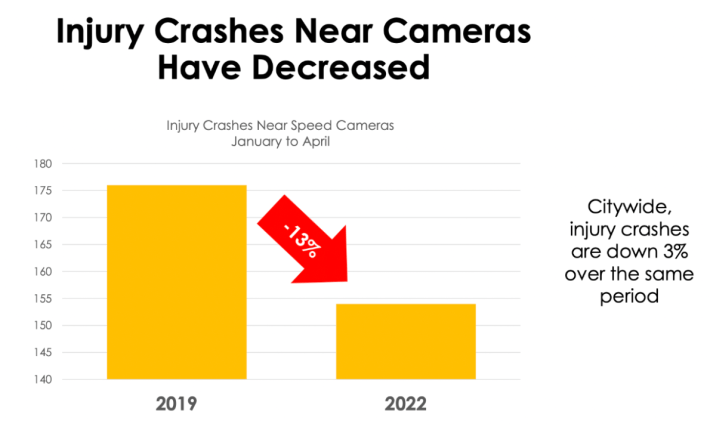
WBEZ said it analyzed over 10 million records from 2014 to early 2022. Here's their main argument for why our city's speed cameras are worthless. "There appears to have been negligible impact on road safety. The average speed of the fastest drivers — those who were ticketed for driving 11-or-more miles per hour over the limit – did not change despite this program’s goal to change behavior and curb dangerous speeding."
Assuming WBEZ's statement that the average velocity of people ticketed for 11 mph+ speeding didn't change is accurate, so what? That's completely irrelevant to the number of people who are speeding in the camera zones.
It's a safe assumption that many motorists who didn't want to be issued tickets chose to stop driving so fast in camera zones. If it's true that between 2014 and 2022 the average speed of people ticketed for driving 11 mph+ over the limit in 30 mph zones remained constant at, say, 45 mph, but the number of drivers committing 11 mph+ violations dropped significantly during that time, that would obviously be a major safety benefit.
As such, WBEZ interpreting its findings on the average speed of 11 mph+ offenders to mean that the cameras aren't improving safety is absurd.
In addition, more recent ticketing data indicates that the new 6 mph rule has been very effective at changing driver behavior for the better.
Like many other news outlets, WBEZ noted there was a dramatic spike in the number of tickets issued by the cameras after the 6 mph threshold went into effect on March 1, 2021. It hit a peak of a whopping 13,889 total citations on May 7 of that year.
However, what has been largely glossed over in the media, including WBEZ, is that since reaching that peak, the number of speed camera tickets issued has fallen fairly steadily, give or take some seasonal variations. (People tend to drive less in the dead of winter, and cameras near schools don't issue tickets when classes are not in session.) It's only natural that many motorists eventually learned to drive slower in the camera zones after the 6 mph rule kicked in.
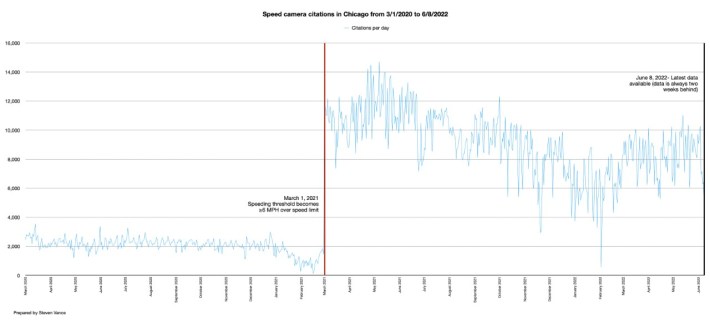
So contrary to what the article claimed, the cameras are "changing behavior." As for whether the decrease in the number of drivers speeding by 6-9 mph means the cams are "curbing dangerous speeding," the answer is also yes.
A 2017 National Traffic Safety Board study found while people struck at 30 mph, our city’s default speed limit, usually survive, those hit at 40 mph almost always die. So there's a big difference between doing 35 mph in a 30 zone (a speed at which you won't get ticketed), and traveling at 39 mph (at speed at which you will.) If you strike someone at 39, you will almost certainly kill them.
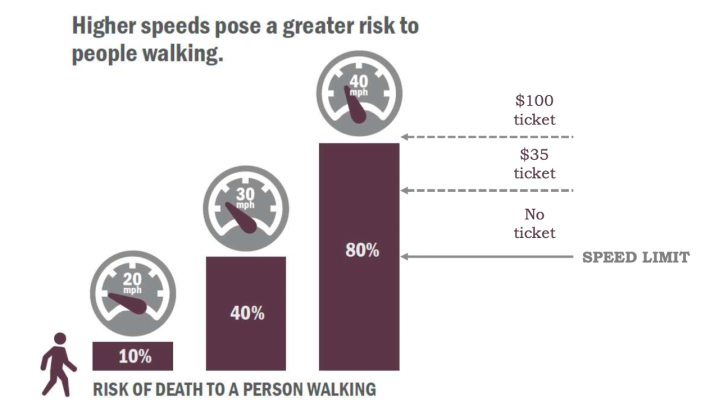
Much of the rest of the piece focuses on racial disparities on who's being recorded breaking traffic laws in traffic camera zones, and the economic consequences for drivers who rack up multiple citations after failing to change their behavior, and accrue ticket debt. These are important topics, but none of this is really news since these issues were highlighted in the UIC report, and Streetsblog Chicago discussed these subjects at length several months ago.
WBEZ interviewed several drivers who said they've experienced economic hardship as a result of camera tickets. "Where is the money going? What is the money being spent on?” asked Roseland resident Lin Whitaker.
The answer, which WBEZ doesn't provide, is that the speed camera revenue is earmarked for safety initiatives, as required by state law. These include traffic safety infrastructure and the Safe Passage initiative to protect CPS students, as well as after-school programs.
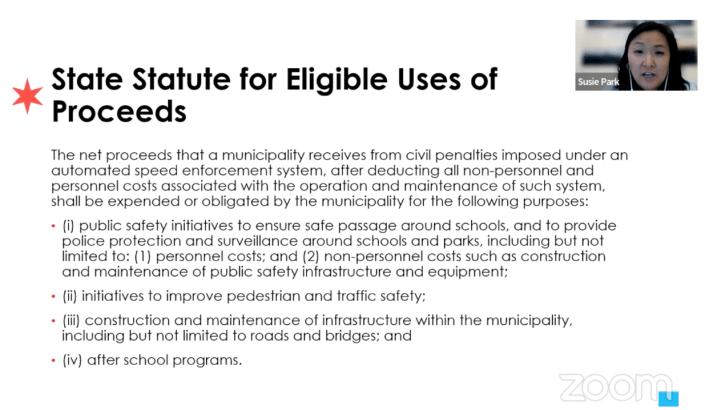
WBEZ also talked with Aurelius Raines II, a high school physics teacher who said he keeps getting caught speeding in camera zones on his way to work, adding that he owes the city more than $400. "It’s starting to become financially crippling," he says.
One has to feel empathy for Raines. But you also have to ask, if he takes the same route to work every day, knows where the cameras are located, and is aware that he will get ticketed if he speeds above a certain threshold, why does he keep doing that?
And WBEZ didn't even mention the real news when it comes to Chicago traffic camera equity issues. Under the city's Clear Path pilot program, launched in April in the wake of the UIC findings, if you're a single person who makes less than $41,000 (more if you live in a larger household), you only have to pay half the regular fine. That's $17.50 for a 6-9 mph speeding ticket, or less than three gallons of gas nowadays, which goes a long way to to address concerns about the fines disproportionately impacting low-income drivers.
Like ProPublica, WBEZ spent lots of time talking about the impact of ticketing on drivers, but almost none discussing the literal impacts of drivers who speed and run red lights on their victims' bodies. But at least ProPublica noted that, tragically, Black Chicagoans are more than twice as likely to die in crashes than white residents, an important thing to keep in mind in conversations about traffic cameras and equity. WBEZ didn't discuss traffic violence victims at all.
Considering that WBEZ's article came out a time when alderpersons are trying to get rid of Chicago's 6 mph ticketing threshold so motorists can drive at deadly speeds with impunity, that's irresponsible journalism. And when you consider that drivers killed three young children in a two-week period this month, it's downright unconscionable.

Did the WBEZ folks consider interviewing the families of these three kids, Rafi Cardenas, 2; Lily Shambrook, 3; and Ja’Lon James, 11? How about talking to the loved ones of the 13-year-old girl who was fatally injured on June 19 in Gresham, when an SUV driver struck the car she was traveling in?
If WBEZ is interested in doing a follow-up piece, they might check in with relatives of the six people who were injured, four of them critically, when a motorist crashed into picnickers last Sunday in Schiller Woods Forest Preserve.
That would be a good antidote to this misleading, totally one-sided piece of anti-cam propaganda.
In addition to editing Streetsblog Chicago, John writes about transportation and other topics for additional local publications. A Chicagoan since 1989, he enjoys exploring the city on foot, bike, bus, and 'L' train.
Stay in touch
Sign up for our free newsletter
More from Streetsblog Chicago
Since COVID, Pace ridership has fared better on major corridors and in north, northwest suburbs than in south, west ‘burbs
The suburban bus system's top five busiest routes largely maintained their ridership rankings.
Due to incredible support from readers like you, we’ve surpassed our 2023-24 fundraising goal
Once again, the generosity of walk/bike/transit boosters is fueling our reporting and advocacy.
Which Metra corridor would become more bike-friendly and greener under a new plan? Ravenswood!
Thanks to plans to convert little-used parking spaces, the avenue is slated to get a new bike lane, and the Winnslie Parkway path and garden will be extended south.
